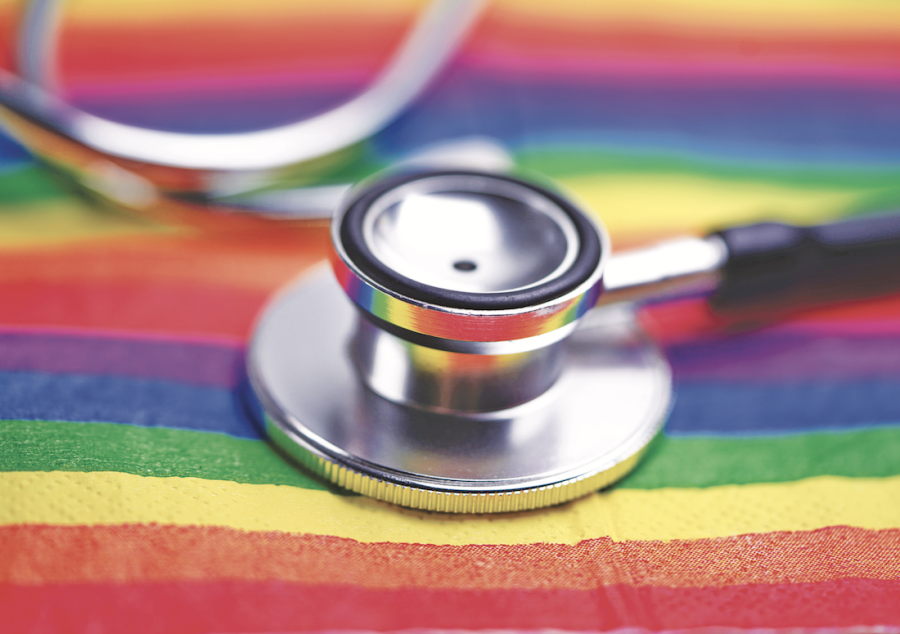Health
Medical curriculum has outdated information on queer people
Queer medical students say they are appalled by some of the terms in their textbooks that have a regressive take.
Aakriti Ghimire
Samundra Gurung was in his third year of medical studies at Nepalese Army Institute of Health Sciences when he first encountered the terms ‘sodomy’ and ‘tribadism’, under the unnatural sexual offences, incorporated in the Forensics Science curriculum.
“Sodomy is the term referring to anal intercourse… The crime is frequent among sailors, prisoners, in hostels, military barracks, etc. for they are thrown together for long times…. Their speech and gait are feminine, they adopt feminine names and their instincts, passions, and expressions correspond to those of females, due to the resulting hormonal imbalance,” read the book, recommended by his forensics professors.
Gurung, who identifies as queer, was uncomfortable since his forensics professor taught the content. Albeit his professor did not teach word for word, as written in the book, the gist remained the same.
“I was extremely uncomfortable when I first encountered sodomy, and it implied directly to gay individuals disregarding the fact that even heterosexuals engage in sodomy. My peers simply made a joke out of it and were laughing it off to mask their discomfort,” says Gurung.
Gurung isn’t alone in feeling this discomfort.
The categorisation of sodomy and tribadism as ‘unnatural sexual offences’ makes queer medical students feel dehumanised and offended. In addition, it imparts erroneous information on anal intercourse and lesbianism to heterosexual medical students.
While medical professors, at an individual level, do not recognise these acts as unnatural or sexual offences, they recommend that students regurgitate these textbook definitions during the exams. This contradiction between reality and textbook knowledge highlights the lack of institutional responsibility in designing a queer-friendly medical environment.
“It’s absolutely ridiculous. Our books read: ‘Lesbians are nymphomaniacs, morbidly jealous, and might kill each other.’ I have never heard of this stereotype before, and suddenly I discover it in my course books?” questions SP, a third-year medical student at Kathmandu University School of Medical Sciences, Dhulikhel.
SP, the Post is identifying the student just with the initials, shares two of their forensics textbooks widely used by medical students in Nepal, written and published by Indian publishers (The essentials of forensic medicine and toxicology, 33rd edition, by Dr KS Narayan Reddy and Dr OP Murty (2014) by Jaypee Brothers Medical Publishers Pvt Ltd; Textbook of Forensic Medicine and Toxicology, Principles and Practice by Krishan Vij, Fifth edition (2011) published by Elsevier.)
The book reads, “Female homosexuality is known as tribadism or lesbianism. Many lesbians are masculine in type…. The practice is usually indulged in by women who are mental degenerates or those who suffer from nymphomania (excessive sexual desire).... It may lead to interference with young girls. Lesbians who are morbidly jealous of one another, when rejected may commit homicide, suicide or both.”
Queer medical students say they are appalled by the categorisation of sodomy and tribadism under unnatural sexual offences act in their textbooks.
Forensics science professors are compelled by the medical curriculum to teach the content, despite their personal reservations. However, as opposed to teaching the curriculum verbatim, professors focus on the practical aspects of evidence collection. They clarify to forthcoming medical doctors that sodomy and tribadism are offences only when non-consensual, contrary to the textbook definitions.
“I personally don’t recommend these books to my students but at the end of the day, these textbooks are widely circulated among students. And I have to teach the content because the curriculum includes these topics,” said Dr Jenash Acharya, head of the Department of Forensic Science at Kathmandu Medical College, Sinamangal.
Albeit Nepali law recognises a third gender category, and the government identified over 100 laws that needed to be changed to eliminate discrimination against LGBTIQA+ people, the medical curriculum still considers queer sex as an unnatural sexual offence.
“There’s nothing unnatural about sodomy or tribadism,” says Dr Abdul Sami Khan, a lecturer of Forensic Medical Toxicology at Kathmandu University School of Medical Sciences, Dhulikhel.
While medical doctors normally lecture on sodomy and tribadism, they clarify that only when the acts are non-consensual, is it an offence, according to Acharya.
However, the curriculum describes both consensual and non-consensual sodomy and tribadism as unnatural sexual offences.
Medical professionals primarily focus on the medico-legal aspect of sodomy and tribadism—the practical data and sample collection in instances of victims of such acts—when non-consensual.
“As forensic professors, we focus on the medical aspect of it as opposed to the moral lens. We emphasise how we examine when individuals who have been forced into sodomy or tribadism come to us, how we deal with collecting samples, helping the victim, and assisting the justice system,” says Dr Eugene Dolma Waling Sherpa, a lecturer at Maharajgunj Medical Campus, Maharajgunj.
These words, nonetheless, can’t be removed from the vocabulary because they are essential in forensic examinations, and crucial to medical knowledge. Experts, however, are in consensus that they should do away with the incorporation of the acts under ‘unnatural sex offences’.
Given the lack of forensics textbooks based on Nepali laws and overlapping medical curriculum, forensics professors in Nepal have no option but to recommend these textbooks from Indian publishers that are based on Indian laws.
Despite the decriminalisation of gay sex in India, the latest editions of the forensics medicine textbooks explain the acts in the same old manner, according to Khan.
However, the impacts of such a one-dimensional focus on the medico-legal aspect have come at the cost of queer individuals’ dehumanisation and a distorted knowledge imparted to medical students. Not only is the content offensive to queer students, but it also impacts the way up-and-coming heterosexual medical doctors perceive queer individuals.
“It’s offensive to read that my sexual identity and preferences are ‘unnatural’ or the ways I engage in sex is an offence. And this content isn’t just relevant to queer people or those questioning their sexuality,” according to SP.
“It is equally relevant to heterosexual individuals because not everyone has as much knowledge on the umbrella of gender and sexuality. Given that it is a hush-hush topic even among medical students, our curriculum shouldn’t be misleading.”
SP shares instances of their transgender friends who have faced discrimination at the hands of medical professionals or have been sent to psychiatric wards outright. They are worried that their would-be doctor friends might become such medical professionals in the future.
“Shouldn’t we envision a queer-friendly medical environment in today’s age? Why are we still reading and writing such outdated things despite the law guaranteeing my identity?” asks SP.
Some medical professionals prefer to use terms like ‘sexual perversion’ or ‘sexual deviation’ as opposed to ‘unnatural sexual offences’ while describing sodomy and tribadism.
“However, the curriculum demands students write exactly what is mentioned in the books,” said Acharya.
The notion of studying for marks is prevalent among both medical students and medical professors. And such an approach to education fuels ignorance and misinformation about anal intercourse and lesbianism among medical professionals.
“Students study for marks and they bear the attitude that they simply should mug up what’s been written. Likewise, professors tell you that it’ll be in the exams so whether what we read is correct or not, we should simply vomit the same thing on our exam papers,” explains Gurung, who is in his fifth year of medical studies.
Queer medical students find the approach to these topics contradictory, ethically concerning and confusing. The distinction between reality and curriculum should end, according to them.
“It is ethically wrong to tell students that the reality is different from what you are studying. More than that, it’s contradictory. The truth is different from what you study and write on your exams,” said SP. “ Why not update the curriculum instead?”
While medical students bear the individual responsibility of educating themselves on wider social issues relevant to the curriculum, students feel that it is the state’s responsibility to teach accurate content, without marginalising or criminalising their existence.
“I agree, we as medical students should educate and update ourselves about what’s acceptable and what isn’t. But how can state-level institutions get away with such categorisation that criminalises our sexual experiences?,” said SP.
“This is not just individual but a state responsibility.”




 8.79°C Kathmandu
8.79°C Kathmandu















